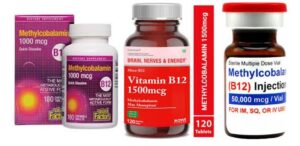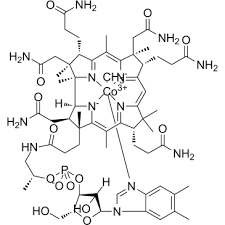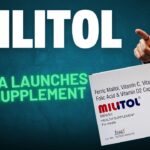Methylcobalamin may be considered as one of the promising dietary supplement and medicine having a number of potential benefits. A ban imposed on methylcobalamin warrants scrutiny in the wake of dual standards by the regulatory authorities of CDSCO and FSSAI.


Methylcobalamin is an activated form of vitamin B12 and it has been used to treat nutritional diseases and also some other diseases such as Alzheimer’s disease and rheumatoid arthritis. As an auxiliary agent, it exerts neuronal protection by promoting regeneration of injured nerves and antagonizing glutamate-induced neurotoxicity. Recently several lines of evidence shows that methylcobalamin may have potential analgesic effects in experimental and clinical studies.
A deficiency in vitamin B12 can cause serious symptoms
Vitamin B12 deficiency is observed more in elderly and pregnant women. Methylcobalamin (commonly known as mecobalamin or methyl B12) is an analog of vitamin B12 which treats or prevents the pathology arising from the deficiency of vitamin B12. It contains methyl alkyl bonds and is different from cyanocobalamin because it contains cynide. A deficiency in vitamin B12 can cause serious symptoms, including fatigue, nerve damage, digestive issues, and neurological disorders such as depression and memory loss.
Therefore, it is necessary to turn to vitamin B12 supplements to help, meet the needs and to prevent a deficiency. Methylcobalamin has been used as a supplement in patients with vitamin B12 deficiency and in those with diabetes and other neuropathies. It has been used in clinical studies to reduce serum homocysteine levels, and it is an essential nutrient and is required to treat vitamin B12 deficiency in people with pernicious anaemia, diabetes and other conditions as well. For example, methylcobalamin alleviates pain behaviours in diabetic neuropathy, low back pain and neuralgia, and it improves nerve conduction, promotes the regeneration of injured nerves, and inhibited ectopic spontaneous discharges of injured primary sensory neurons.
It is important for the brain, nerves and for the production of red blood cells and it is the only form of vitamin B12 that can cross the blood brain barrier without bio-transformation. Methylcobalamin is the methyl form of cobalamin obtained from hydroxycobalamin, either by chemical manipulation in the lab or in the body as a natural process. Cyano- and hydroxocobalamin are considered the transport forms of cobalamin, while methylcobalamin and deoxyadenosylcobalamin are the active forms involved in enzymatic reactions. Information suggests methylcobalamin may play a role in immune modulation and in cancer.
Methylcobalamin used in clinical studies
Methylcobalamin has been used in clinical studies to reduce serum homocysteine levels. Methylcobalamin is the most abundant form in human plasma, whereas in most human tissues, deoxyadenosyl cobalamin is the most abundant, with aquacobalamin coming second. Methylcobalamin plays a key role in maintaining good health. It is needed for integrity of myelin, neuronal function, proper red blood cell formation and DNA synthesis. It is a beneficial drug to most of the common disorders such as cardiovascular disorders, diabetes, anemia, hyperhomocysteinemia and degenerative disorders, diabetic neuropathy, degenerative disorders and in the preliminary treatment of amyotropic lateral sclerosis.
It has been used to treat some nutrition based disease such as dementia and exerts neuronal protection by promoting regeneration to injured nerves. It antagonizes the glutamate induced neurotoxicity and also manifests analgesic effects. It alleviates pain behavior in diabetic neuropathy, low back pain, neuralgia and promotes nerve conduction. It helps the body to use fats and carbohydrates for energy.


Methylcobalamin’s oral administration of 500 mcg three times daily for four weeks results in improvement of peripheral neuropathy and it produces very significant effect after 12 weeks of treatment. An improvement in vibration sense, lower motor neuron weakness and sensitivity to pain is also observed in various studies.
For stress relief, methylcobalamin can be taken in the dose of 500 mcg per day. In the acute cases of neuropathy, dose of 1500 mcg per day can be taken. Dose of 1 mg per day is required to be taken for age related brain decay. Methylcobalamin can be combined with similar dose of folic acid and pyridoxine. Deficiency of vitamin B12 is strictly seen in pure vegetarian, dose of 100 mg day can rebalance its requirement in the intestine. All human being need at least 3 mg per day of this drug for the basic nerve support.
Safe use even at high dosages:
Vitamin B12 has a long history of safe use even at high dosages. At usual dosages, the cobalt and cyanide content are not considered to be toxicologically relevant. Vitamin B12 is obtained from animal products (eg, meat, fish, shellfish, poultry, eggs, milk, and milk products). Tempeh, made from fermented soybeans, contains the beneficial bacteria responsible for producing vitamin B12.
Commercial forms of methylcobalamin are produced in the lab through the conversion of cyanocobalamin. Cyanocobalamin is a synthetic form of vitamin B12 that is not naturally available. It is used more frequently in supplements, as it is considered more stable and cost-effective than other forms of vitamin B12. When cyanocobalamin enters human body, it is converted into either methylcobalamin or adenosylcobalamin, which are the two active forms of vitamin B12 in human body. Vitamin B12 deficiency can be solved with the administration of cobalamin. Usually either cyano- or hydroxo-cobalamin is used to restore normal levels. However, there is no reason to suggest lack of efficacy; and reports exist of therapeutic efficacy of methylcobalamin.
A systematic review shows evidence supporting vitamin B12 supplementation to reduce the risk of diabetes or cardiovascular disease. A 2013 meta-analysis that included 15 studies and 1,106 diabetic patients found combination therapy for 2 to 4 weeks with intravenous alpha lipoic acid 300 to 600 mg/day plus intravenous methylcobalamin 500 to 1,000 mg/day to be superior to methylcobalamin monotherapy for improving nerve conduction. Similarly, combination therapy with prostaglandin (10 or 20 mcg intravenous), methylcobalamin (500 to 1,500 mcg intravenous/intramuscularly plus lipoic acid (300 or 600 mg/day intravenous) significantly improves nerve conduction velocity compared with combination therapy without the lipoic acid in a 2015 meta-analysis of 18 randomized clinical trials involving patients with diabetic peripheral neuropathy.
A Cochrane systematic review and meta-analysis of antioxidants for male sub fertility identified one double-blind, randomized, parallel study that administered vitamin B12; however, the lack of useable data prevented its inclusion in the meta-analysis. Japanese men with abnormal sperm count or motility received mecobalamin at a dose of either 1,500 or 6,000 mcg/day for 12 weeks. No statistically significant difference was observed in sperm parameters compared to placebo.
Folate and vitamin B12 are essential nutrients which are not synthesized in humans and whose deficiency is considered as heath problem globally such as anemia and neuronal dysfunction. Methylcobalamin (5 mg, 60 mg vegetarian lozenges) is active in the central nervous system outside the mitochondrion and is essential for cell growth and replication. Sometimes the liver cannot convert cyanocobalamin into adequate amount of methylcobalamin needed for proper neuronal functioning. Through enhanced methylation, it exerts its nerve cell protective effect and accelerates its growth. Methylcobalamin is the only form of vitamin B12 that can cross the blood brain barrier without biotransformation, and it converts homocysteine to methionine and reduces the potential to damage. It also forms adenosylcobalamine, the other form of vitamin B12 for mitochondrial energy production.
Working or acting mechanism of methylcobalamin


Methylcobalamin works by functioning in the production of a compound called myelin, which covers and protects nerve fibers, rejuvenates the damaged neuron. Without enough methylcobalamin, myelin sheath does not form properly due to which nerve fibers suffers and people experience irreversible nerve damage. An intrinsic factor made in the stomach, must be present in the intestinal tract to allow its proper absorption. People lacking this factor show vitamin B12 deficiencies such as pernicious anemia (a slow and insidious process that can end in death. Pernicious anemia in fact means ‘leading to death’). Methylcobalamin is used as a cofactor in methionine transferase enzyme, an enzyme which converts amino acid homocysteine to methionine through folate cycle.
Vitamin B12, also known as cobalamin, is an important water-soluble vitamin involved in red blood cell production, brain health, and DNA synthesis. Vitamin B12 has a long history of safe use even at high dosages. Vitamin B12 is obtained from animal products (eg, meat, fish, shellfish, poultry, eggs, milk and milk products). Tempeh, made from fermented soybeans, contains the beneficial bacteria responsible for producing vitamin B12. Methylcobalamin and cyanocobalamin can be converted to other forms of vitamin B12. Both methylcobalamin and cyanocobalamin are reduced to a cobalamin molecule that is converted to the active forms of this vitamin within the cells of the body.
Some researchers recommend treating vitamin B12 deficiency with either cyanocobalamin or a combination of methylcobalamin and adenosylcobalamin due to distinct properties of these latter two forms. Although distinct differences exist between methylcobalamin and cyanocobalamin, both have beneficial effects on health and can prevent vitamin B12 deficiency. Studies find that treating seven vitamin B12-deficient People with oral methylcobalamin normalized vitamin B12 levels in their blood within just 2 months.
Similarly, another study shows that taking cyanocobalamin capsules for 3 months also increased vitamin B12 levels in 10 people with pernicious anemia, a condition caused by impaired B12 absorption. Other some studies show that both methylcobalamin and a B-complex containing cyanocobalamin were effective in reducing symptoms of diabetic neuropathy, a complication of diabetes that leads to nerve damage. Additionally, many animal studies have found that each form could have neuroprotective effects and may be beneficial in treating conditions that affect your nervous system.
Conclusion
The blanket ban on methylcobalamin would soon to be revoked as it has been approved by FSSAI scientific panel as a nutraceutical ingredient. It is an essential nutrient and is required to treat vitamin B12 deficiency in people with pernicious anemia, diabetes and other disorders. Methylcobalamin aids in growth of healthy blood cells, nerve cells in the body. It is a best treatment as well as dietary supplement for the people who cannot absorb vitamin B12 and/or suffers from its deficiencies. Monotherapy of methylcobalamin improves plasma/serum homocysteine level and improve the neuropathic symptoms also. Combination therapy with other vitamin B complexes seems to be more effective. Hence, methylcobalamin may be considered as one of the promising dietary supplement and medicine having a number of potential benefits.
Methylcobalamin is widely marketed in the country as a drug for neurological disorders with a recommended dietary allowance of 2000 mcg intramuscular but according to FSSAI it is detrimental for patients when it used above 1 mcg for prevention and disease management. Industry experts pinpoint that a ban imposed on methylcobalamin warrants scrutiny in the wake of dual standards by the regulatory authorities of CDSCO and FSSAI.
Nutraceutical experts have contested that when gazette notification is talking about vitamin B12, it refers to which type of vitamin B12 as all four vitamin B12 such as methylcobalamin, cyanocobalamin, hydroxycobalamin and adenocylcobalamin are different and have different level of absorption in the human body, and therefore recommended dietary allowance and upper limit for each type of vitamin B12 must be different.


Dr Sanjay Agrawal
Leading Pharmaceutical Consultant
Editor-in Chief of IJMToday











